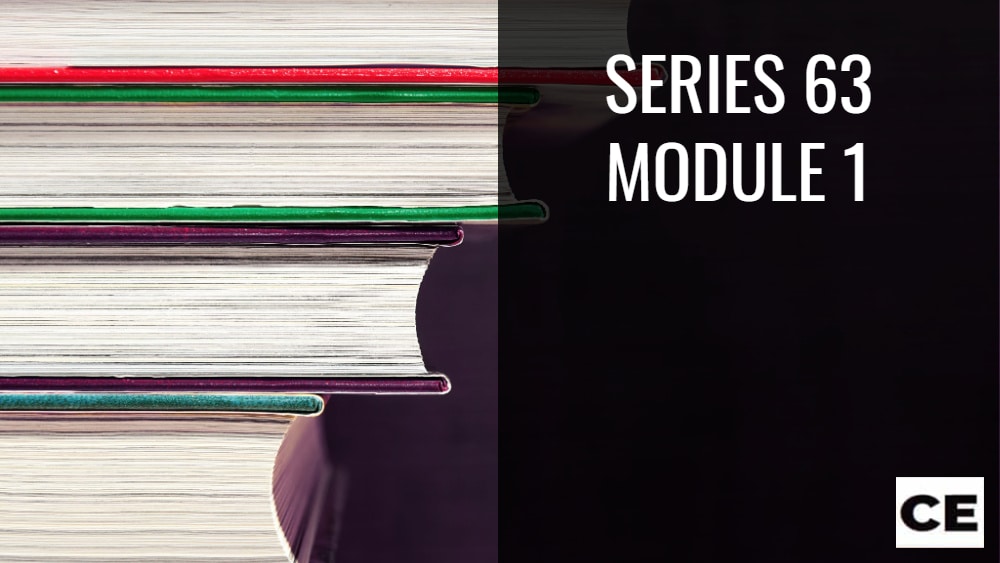Hi all, welcome to the top article on the Series 63 Exam.
Read through this piece and we promise you will get acquainted with what the Series 63 Exam is all about, the preparation tips, the pass rate, and the passing score needed to scale through this Exam.
And in our article today, we are covering tons of useful information about this securities exam including:
- A brief overview of the content outline
- The pass rate for this exam
- The passing score candidates need to achieve
- Series 63 frequently asked questions
Let’s begin!
Other free series 63 study materials:
- Series 63 exam prep
- Series 63 study plan
- Series 63 study guide
- Series 63 practice exams
- Series 63 flashcards
- Series 63 cheat sheet
- Series 63 Exam FAQ
- Best Series 63 study materials
Introduction to Series 63 Exam
The Series 63 licensing exam is something that all financial professionals that have either their Series 6 or Series 7 will have to pass to practice in most American states.
Series 63 Exam Overview
A brief overview of what the Series 63 is all about is a great starting point to get us into the flow of things.
It’s critical to note if you want to sell securities as a broker-dealer in just about any state in the United States, you will need this license.
To begin, this is a North American Securities Administrators Association (NASAA) exam that’s administered by Financial Industry Regulatory Authority (FINRA).
It is also known as the Uniform Securities Agent State Law Examination.
Test-takers for this exam would already have passed other FINRA Series exams, as well as the Securities Industry Essentials (SIE) qualification exam.
A form U4 is not a prerequisite either.
What about sponsorship from a FINRA member firm?
That’s not needed at all.
Why is the Series 63 a critical exam that’s essential for broker-dealers that have secured either their Series 6 or 7 licenses already?
Well, this is a state law exam that’s a requirement in 44 states in America.
The Series 63 exam is not required by broker-dealers in the following states.
- Colorado
- Florida
- Louisiana
- Maryland
- Ohio
- The District of Columbia
- Puerto Rico.
So what does the FINRA 63 test?
Well, it looks at a candidate’s knowledge and understanding of the state laws that deal with various fiduciary obligations, ethical practices, and other regulations.
Now let’s talk a little about who would need a Series 6 license.
Well, anyone that wants to sell securities within the securities industry in a nutshell, for example, someone selling annuities.
Those that might need to pass this licensing exam might work at a brokerage or investment firm, act as a financial adviser or insurance agent, or work in investment banking.
Let’s take a brief look at what the FINRA Series 63 covers.
The exam is split into the following topics:
- Regulations: This accounts for 45% of all questions
- Ethical practices: This accounts for 25% of all questions
- Customer communication: This accounts for 20% of all questions
- Administrative provisions: This accounts for 10% of all questions
Other quick facts you need to know about the Series 63 exam
Unlike the Series 7 exam, for example, this isn’t a lengthy test at all.
There are just 60 questions that you will need to answer.
As for a time frame, you get 75 minutes (1 hour and 15 minutes) to complete it.
That’s a little over one minute per question, so you certainly can’t dawdle when writing it.
When it comes to the overall cost, the Series 63 exam isn’t cheap.
It’s going to cost you $147 to register.
While this is an exam only administered by FINRA, it still will consist of multiple-choice questions only.
As for how hard the exam is, well, it’s not something that’s up there with the Series 7, that’s for sure.
That said, test-takers need to take it seriously if they want to pass on their first attempt.
That means making sure you put in the necessary test prep before you write.
If you don’t pass the first time, both NASAA and FINRA will give you the chance to rewrite the exam.
There are a few rules in place when it comes to this, however.
- Your second attempt can take place 30 days after your first try
- You have to pay the exam fee of $147 for each retake attempt you make
- Should you fail a third time, the waiting period between attempts moves from 30 days to 180 days
You’ve got three chances to make sure you don’t hit that massive 180-day delay between attempts.
Candidates should therefore prepare properly, but not by only using coursework.
For example, there are many excellent extras available when it comes to adding to your preparation.
These include:
- Study materials such as flashcards, practice questions, prep courses, and more
- Full practice exams
- Study guides
Series 63 Pass Rate
Now it’s time to get onto some critical information about just how hard the Series 63 exam is.
Well, when it comes to the pass rate for this exam, it gets a little tricky.
And the main reason for that is because the passing scores are state-based and therefore vary.
Finding those passing scores for each state was impossible, it’s just not easy to come across.
But luckily, there is a light on the horizon in terms of getting an idea of some kind of pass rate figure.
That’s because the Wall Street Journal in New York took the time to poll over 350 000 financial advisors who have Series 63 licensing.
That showed that only 14% of them didn’t pass the Series 63 exam on their first attempt which means 86%, well over two-thirds of them did.
That’s a pretty high pass rate, right?
But don’t be fooled.
It certainly doesn’t indicate that the Series 63 exam is a walk in the park.
And the pass mark candidates need to achieve for the exam?
Well, that’s set at 72%.
Candidates therefore will need to get 43 out of the 60 questions correct if they want to secure their Series 63 state license.
Exam structure
To achieve that 72% and get yourself a first-time pass, understanding the overall exam structure of Series 63 can help tremendously.
Earlier in this article, we did see that almost half of the questions on the exam cover various state regulations.
The next biggest group of questions will then cover ethical practices.
This accounts for a quarter of all questions.
That’s followed by customer communication questions which contribute a fifth of the exam in total.
Finally, the last batch, a tenth of the paper in total, pertains to administrative provision questions.
But we can go even a little deeper into the overall structure of the exam.
Here’s what’s covered in terms of overall question weight.
- Regulation of Investment Advisers: Three questions in total which amounts to 5% of the exam
- Regulation of Investment Adviser Representatives: Three questions in total which amounts to 5% of the exam
- Regulation of Broker-Dealers: Nine questions in total which amounts to 15% of the exam
- Regulation of Agents of Broker-Dealers: Nine questions in total which amounts to 15% of the exam.
- Regulation of Securities and Issuers: Three questions in total which amounts to 5% of the exam
- Remedies and Administrative Provisions: Six questions in total which amounts to 10% of the exam
- Communication with Customers and Prospects: Twelve questions in total which amounts to 20% of the exam
- Ethical Practices and Obligations: 15 questions in total which amounts to 25% of the exam
This is more than useful information to know when you are preparing for your exam, that’s for sure.
That’s not counting extra exam prep such as study guides or taking practice exams either.
Series 63 Frequently Asked Questions
What is the pass rate for the Series 63 exam?
There are no official figures when it comes to the pass rate for this FINRA exam, unlike the SIE exam, for example. Luckily, the Wall Street Journal asked 350,000 brokers about their Series 63 results. 86% indicated a first-time pass, so that’s a good indication.
Do you need Series 63 if you have Series 7?
Well, it depends on which state you are working in. In Colorado, Florida, Louisiana, Maryland, Ohio, the District of Columbia, and Puerto Rico, you won’t need Series 63 licensing. In all the other states in America, it is a requirement for those with a Series 6 or 7 license.
How hard is Series 63?
Well, it has a pass rate in the mid-80s, based on the 350,000 brokers surveyed by the Wall Street Journal. This is a tough exam. Don’t be fooled by the fact that it’s just 60 questions. According to Knopman, candidates need around 30 hours of prep time.
Is the Series 63 or 65 harder?
It’s difficult to say which is harder, to be honest. There is a distinct difference between them when it comes to the number of questions. Series 63 has 60 questions (75 minutes completion time), while Series 65 has 130 questions (3 hours completion time).
What states don’t need combined Series 6 and 63 licenses?
There are quite a few states in America where you won’t need to combine Series 6 and 63 licenses. These states are Colorado, Florida, Louisiana, Maryland, Ohio, the District of Columbia, and Puerto Rico. All the other states require registered representatives to combine Series 63 and 6.
How hard are Series 7 and 63?
Series 7 is a tough exam. It has 135 questions, takes close to four hours to complete, and needs at least 80 to 90 hours of preparation. Series 63 is only 60 questions in 75 minutes and will require at least 30 hours of preparation.
Is sponsorship needed to write Series 63?
No, not at all. There is no prerequisite for this exam. Sponsorship from a FINRA-member firm is not required. You can write it even before you have your Series 6 or 7 license. Candidates must complete Form U10 to write it.
How long should you study for Series 63?
Most experts say that you need to work through the coursework for around 30 hours. That doesn’t include extra Series 63 exam prep, like taking practice exam questions. Make sure you work revision into your study time to keep everything fresh.
How much does it cost to take the Series 63?
While the exam itself is relatively short – just 60 questions and 75 minutes to complete – it is rather expensive. To book your Series 63 exam date, you will have to pay $147. You may also need prep courses that range from $60 to $200.
How do I schedule my Series 63 exam?
– Your firm will fill out Form U4 to request the exam enrollment. If you are self-sponsored, you’ll fill out Form U10.
– Make a payment of $147
– Once registered, you have 120 days to schedule your exam date.
– Prepare to pass the exam on the first attempt
How many questions must I answer correctly to pass the exam?
You must answer 43 out of 60 questions to pass the Series 63 exam. The exam has 65 multiple-choice questions, where five questions are pretest and therefore not scored. The passing score for this exam is 72%. If you fail, you can retake the exam.
Where do I take the Series 63 exam?
All NASAA exams, including the Series 63 exam, are taken at a Prometric test center. You should visit the Prometric website and search for the Series 63 exam. From there, select a test center near you. Next, select the date and time that best suits you and book the exam.
What are the continuing education requirements once I have a Series 63 license?
The North American Securities Administrators Association is yet to enact continuing education for investment representatives with Series 63 licenses. However, since either Series 6 or 7 is a requirement for the Series 63 exam, you’ll be required to meet FINRA continuing education requirements for these licenses.
How many questions are on the Series 63 exam?
The Series 63 exam has 65 multiple-choice questions. Sixty questions are scored and go towards your final score. Five questions are pretest. They are randomly distributed in the exam, so you won’t know which ones they are. That said, give the whole exam your best.
What will I be able to do with the Series 63 license?
With the Series 63 license, you become a registered representative of a broker-dealer. You’ll become an agent of a broker-dealer. As an agent, you’ll get a commission for the securities products you sell. The products you sell depend on whether you have Series 7 or 6.
What is the waiting period if I fail the Series 63 examination?
If you fail the Series 63 exam on your first attempt, you’ll have a 30-day waiting period. The waiting period increases to 180 days if you fail three times consecutively. Also important to note is that you’ll pay the same exam fee with each retake.
Why should I get the Series 63 license?
Series 63 exam is a state requirement for registered representatives to conduct business with the public in various states. The license qualifies you as an agent for a broker-dealer. Most financial professionals take the exam when getting started in the securities industry.
What is the passing score for the Series 63 exam?
The passing score for the Series 63 exam is 72%. Test-takers must score 43 out of 60 scored questions to pass. Series 63 exam requires thorough preparation to pass. The exam is tricky, and the exam duration is tight. Take practice exams to familiarize yourself with the test.
What is the Series 63 exam?
Series 63, also known as Uniform Securities Agent State Law Examination, is a NASAA exam administered by FINRA. It’s a state law test for broker-dealer representatives. Registered representatives must have Series 6 and 7 licenses or both to take the exam.
What topics are covered in the Series 63 exam?
The Series 63 exam tests registered representative principles of state securities regulations and rules prohibiting dishonest or unethical practices. The topics covered in the exam include:
– Securities regulations
– Administration provisions
– Customer communication
– Ethical practices and business obligations
What are the requirements for sitting for the Series 63 exam?
There are no educational requirements for sitting for the Series 63 exam. Test-takers can sponsor themselves by filling out Form U10. If one works for a FINRA member firm or SRO, the organization will fill out Form U4 if they’ve worked with them for four months or more.
How do I earn a Series 63 license?
– Pass the SIE exam
– Seek employment opportunity in a FINRA member firm or SRO to take the Series 6 exam, Series 7 exam, or both
– Prepare and pass both exams
– Enroll for the Series 63 exam, study, and pass
– Apply for the Series 63 license
How long is the Series 63 exam valid if I haven’t been registered?
After passing the exam, you have two years to register and get the Series 63 license. If you go beyond two years window, your qualification will expire. That means you’ll have to retake the exam, which translates to additional payment and studying.
What jobs can I get with a Series 63 license?
If you have Series 63 and Series 6, you can work as an insurance agent or financial adviser at a bank, insurance company, brokerage, or investment firm. With Series 63 and Series 7, you can work as a stockbroker at a bank, brokerage, or investment firm.
How long will my Series 63 license remain valid if I stop working for my firm?
You have a two-year window. If you stop working for your employer, the firm will file Form U5 to suspend your registration. You’ll have two years to get another job. Once you are employed again, your new employer will fill out form U4 to re-register you.
Conclusion
Thanks for taking the time to read through this article that covers the Series 63 pass rate and frequently asked questions.
This is a very different exam from Series 6 for example and those who undertake it have to be prepared to go through lots of word-heavy coursework.
Don’t let the overall pass rate of 86% fool you, either.
While you won’t need to spend as many hours as you would on other licensing exams, there’s no doubt that there’s plenty of preparation involved.
We’ve also done our best to answer the most frequently asked questions, but if you have any other queries, please do not hesitate to leave a comment below and we will get back to you.
Reference
1. Kaplan
2. Knopman
3. Investopedia
4. Brainscape
5. Pocketprep









